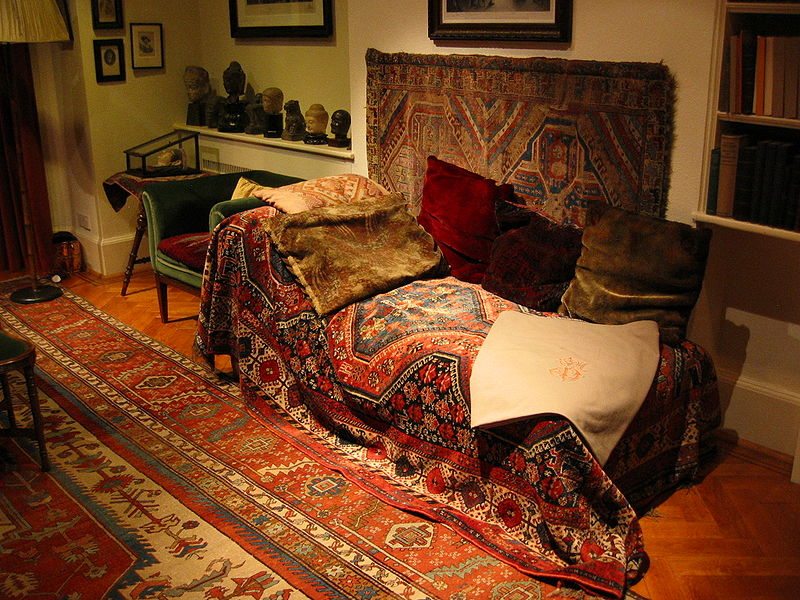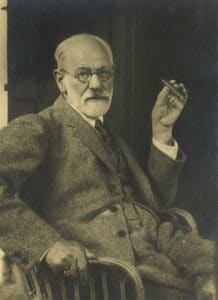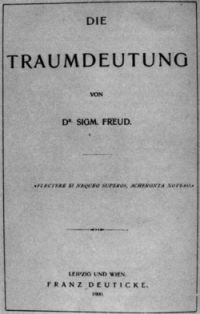
Links om Freud & psykoanalysen med sites, artikler og bøger med debat om Sigmund Freud, østrigsk psykolog, som grundlagde psykoanalysen.
Sigmund Freud blev født i Freiberg (i Mähren i det daværende Østrig-Ungarn, nu tjekkiske by Příbor) 6. maj 1856 og dør 23. september 1939 i landflygtighed i London.
September 2009 (Tidsskriftcentret).
Revideret september 2019 (Socialistisk Bibliotek).
Links on Freud and psychoanalysis, links to sites, articles and books with debate on Sigmund Freud, Austrian psycologist.
Sigmund Freud was born in Freiberg (in Mähren in the then Austria-Hungary, now the Czech republic town of Příbor) May 6, 1856 and dies September 23, 1939 in captivity in London.

Indhold / Content:
- Leksikale og sites / Encyclopedias & sites
- Artikler og debat / Articles and Debate
- Bøger /Books (in Danish only)
- Se også / See also.
- Se også på Socialistisk Bibliotek
Leksikale og sites
In Danish:
- Freud, Sigmund. Af Svein Haugsgjerd (Leksikon.org)
- Sigmund Freud (Wikipedia.dk)
- Sigmund Freud. Af Ole Andkjær Olsen (Denstoredanske.dk). Længere leksikal artikel.
- Det Danske Sigmund Freud Selskab (site). Med biografi, bibliografier, tekster om Freud + links.
In English:
- Sigmund Freud (Wikipedia.org). With notes, bibliography and links.
- Sigmund Freud Archive (Marxists Internet Archive). Biography – Works – Further readings (Lev Vygotsky, Betty Friedan and Simone de De Beauvoir on Freud etc.)
- Books by Freud (Project Gutenberg)
- Psychology and Marxism (Marxists Internet Archive). Marxist Works – Reference Works – Commentary.
- Sigmund Freud: Conflict & Culture (Library of Congress Exhibition, 1997-1998). Sections: 1. Formative Years, 2. The Individual: Therapy and Theory, 3. From the Individual to Society.
Artikler og debat:

In Scandinavian:
6. maj 1856: Sigmund Freud fødes (Arbejderen.dk, 6. maj 2009). Kort intro-artikel til Freud.
Ny biografi gør op med Freudbashing. Af Tine Byrckel (Information.dk, 26. septemer 2014). “En fransk historiker [Elisabeth Roudinesco] har gravet i nyåbnede arkiver og viser os tænkeren som det, han var: et barn af sin tid.”
Hinsides kunst og vitenskap. Av Espen Grønlie (Le Monde Diplomatique, nr.12, desember 2011; online på Internet Archive). “To nye norske bokutgivelser trekker Freud i hver sin retning: til vitenskapen og til litteraturen.”
Et progressivt forsvar for psykoanalysen (Socialistisk Arbejderavis, nr.243, juni 2005). “Siden Freud første gang fremlagde sin videnskab, er han blevet angrebet fra både højrefløjen og venstrefløjen i det politiske og pædagogiske landskab. Jan Hoby forklarer, hvad Freuds teorier går ud på og argumenterer for, at Freud og psykoanalysen ikke bør skrottes men videreudvikles.”
Freuds svigt og løgn. Af Nils Wiklund (Politiken, 7. februar 2004; online på Psykologibasen.dk). “Freud var ikke bare en skidt person i privaten. Han snød med sin forskning og pyntede på sine behandlingsresultater. En fransk psykiater, Jacques Bénesteau, har samlet kritikken af den freudianske psykoanalyse og tegner et skræmmende billede af en terapeutisk praksis …”
Se replik fra Christian Braad Thomsen: Lystmordet på Freud (14. februar 2004; online på Braadthomsen.dk). “Disse års rabiate Freud-kritikere ofrer enhver videnskabelig anstændighed på et politisk korstogs alter.”
Freuds mørke menneskesyn. Af Eric Danielsen (Kristeligt Dagblad, kronik, 26. juli 2003). “Sigmund Freud lagde ikke skjul på, at han så mennesket som af natur uforbederligt ondt og aggressivt. I påstanden om, at man ikke kan lave om på den menneskelige natur, ligger også, at man ikke kan lave om på det etablerede system.”
Freud: menneskets ondskab er medfødt (pdf). Af Eric Danielsen (Psyke & Logos, nr.24, 2003, s.825-832). “Han er kommet til at stå som en af hovedeksponenterne for den opfattelse, at vold og aggression er et uudryddeligt træk ved selve den menneskelige natur. Freud repræsenterer det generelle standpunkt, at aggression indgår i menneskets gener, altså er medfødt …”
In English:
How Red Vienna revolutionized Sigmund Freud. By Phillip Henry (Jacobin, May 28, 2020). “Sigmund Freud often regretted the fact that most of his patients were drawn from the upper classes. But when socialists turned Vienna “red” after World War I, neurotics both rich and poor gained access to free treatment and new experimental methods.”
A few remarks on Freud and women (Verso, Blog, 12 September 2018). “Linda Roland Danil explores Freud’s ambiguous position on women’s emancipation in light of the #metoo movement.”
Political Freud: A History. By Kurt Jacobsen (Logos: A Journal of Modern Society & Culture, Vol.15, No.1, Winter 2016). Review of Eli Zaretsky’s book (Columbia University Press, 2015, 248 p.). “Readers will emerge from Political Freud with a clearer sense of what is lost and must be recovered in the much-maligned psychoanalytic tradition. This brilliant riposte to Freud-bashers ought to be, as they say, on every shelf.”
Marxism and psychology (Socialist Review, Issue 410, February 2016). “Continuing a strand of debate, Canadian socialist Susan Rosenthal argues that we must look to social rather than individual solution to mental ill health.”
Freud, sex and the socialist imagination. By Mark O’Brien (Socialist Review, Issue 408, December 2015; online at Internet Archive). “Freud’s methods may not have been very scientific, but his insights into the social construction of gender and sexual identity were remarkably radical for a middle class man in conservative Vienna a century ago. Socialists can take those radical insights far further.”
What’s wrong with Sigmund Freud? By Susan Rosenthal (Socialist Review, Issue 404, July/August 2015). “The pioneer of psychiatry began as an advocate of the oppressed, documenting the effects of trauma on mental health. But he soon switched sides to justify the status quo.”
Debate:
- In defence of Freud’s innovation (ibid., Issue 405, September 2015). “Sabby Sagall begs to differ, seeing in Freud, and crucially his theoretical successors, a revolutionary potential.”
- Letters: Freud’s theories led to useful developments. By Maggie Palmer (ibid., Issue 405, September 2015; online at Internet Archive).
- Revolutionary kernel in Freud’s ideas. By Iain Ferguson (ibid., Issue 405, September 2015; online at Internet Archive).
- Refreshing on Freud. By Lucretia Packham (ibid., Issue 406, October 2015; online at Internet Archive).
- Freud debate welcome. By Michael Rosen (ibid., Issue 407, November 2015; online at Internet Archive).
- Freud isn’t scientific. By Phil Webster (ibid., Issue 407, November 2015; online at Internet Archive).
- Don’t deny reality of mental illness. By Sabby Sagall (ibid., Issue 407, November 2015).
A Dangerous Method: The Freud-Jung controversy, among other matters. By David Walsh
(World Socialist Web Site, 8 February 2012). David Cronenberg has undertaken to direct a film about a major episode in the history of psychoanalysis, the relationship between Sigmund Freud and Carl Jung in the early years of the 20th century and their ultimate falling out.”
The legacy of Freud (International Review, No.140, 2010). “But the Nazis were not alone in their hatred for Freud. Their fair-ground mirror image, the Stalinists, had also decided that Freud’s theories needed to be denounced from the pulpits of the state.”
Sigmund Freud: the great explorer. By Thomas Carolan (Solidarity, No.93, 11 May 2006). “Freud broke through the taboos on sexuality and explored female sexuality, showing that sexual malfunction, frustration and repression lay at the root of neuroses and of much human suffering.”
Debate:
- Acknowledge Freud’s mistakes. By Lynne Moffat (No.95, 22 June 2006). “Thomas Carolan is far too generous to Freud. Freud was insightful, and drew attention to the field of psychology …Freud’s theories continue to have great influence today. But he got many things wrong.”
- Freud: neither for nor against! By Lawrence Welch (No.96, 13 July 2006). “I was glad to see Solidarity celebrating the 150th anniversary of Freud’s birth in Thomas Carolan’s article and Lynne Moffat’s rejoinder, though I feel there are problems with both their positions.”
The dream ticket. By Sabby Sagall (Socialist Review, Issue 210, July/August 1997). “So why is Freud of interest to socialists? Firstly, because psychoanalysis provides a powerful critique of a society that denies human beings the satisfaction of basic needs. Secondly, it throws considerable light on the nature of human alienation under capitalism …”
Debate: Letters: A block of understanding, by John Molyneux and others on Freud (Issue 211, September 1997).
Why Freud was wrong: Sin, Science and Psychoanalysis. By Richard Webster (Harper and Collins, 1996, 692 p.). “This study of Sigmund Freud’s life and work sets out to provide an answer to the controversies which have raged for a century around one of the most influential of all modern thinkers.” See Richardwebster.net (online at Internet Archive) with excerpts from the book + related essays.
Debate:
- ‘Burying Freud’: The Sigmund Freud and Psychoanalysis discussion (Human-nature.com; online at Internet Archive)
- Unconscious revolutionary. By John Parrington (Socialist Review, Issue 203, December 1996). Review of Websters book: “The first part of this book undoubtedly contains one of the most convincing critiques of Freudianism that I have read.”
- Debate by Paul Jakubovic and Phil Webster (ibid., Issue 204, January 1997).
- Debate by Peter Dyson, Noel Hallifax, Ben Watson, Colin Wilson and Peter Wearden (ibid., Issue 205, February 1997).
The sexual solipsism of Sigmund Freud. Chapter 5 in Betty Friedan: The Feminine Mystique (1963; online at Marxists Internet Archive). “I think much of the Freudian theory about women is obsolescent, an obstacle to truth for women in America today, and a major cause of the pervasive problem that has no name.”
The politics of psychoanalysis: The political implications of Freudian psychoanalysis. By Robert Stiler (New International, Vol.12, No.6, August 1946; online at Marxists Internet Archive). “Freud has made contributions to human psychology of incalculable value. His genius lay in his ability to probe deeply into the human mind in spite of the handicap of an outmoded scientific method.”
Early Marxist criticisms of Freudian psychoanalysis: Karl Korsch and Georg Lukács (The Charnel-House, Blog by Ross Wolfe, June 2016). Karl Korsch article from Living Marxism, February 1942 + Georg Lukács article from Die rote Fahne, August 1922.
Bøger:
Danske bøger om Sigmund Freud – eller med væsentlig affinitet til Freud og hans teorier (Det Danske Sigmund Freud Selskab).
Fokus på Freud. Af Ole Andkjær Olsen, Chr. Braad Thomsen, Bente Petersen (red.) (Hans Reitzels Forlag, 2006, 335 sider).
Se FagbogInfo + anmeldelse af Jan Hoby: Freud og psykoanalysens aktualitet (Modkraft.dk/Kontradoxa, 15. oktober 2006) (næsten lig ovenstående artikel på dansk af samme forfatter, 2005).
Den ukendte Freud. Af Eric Danielsen (Dansk psykologisk Forlag, 2000, 255 sider)
Anmeldelser og debat:
- Freud er fuld af løgn. Af Finn Abrahamowitz (Information.dk, 19. juli 2000).
- Smædeskrift om Freud. Af Chr. Braad Thomsen (Politiken, 30. juni 2000; online på Internet Archive).
- I kjertens bløde skær (pdf). Af Ole Vilhelm Wagner (Psykolog Nyt, nr.18, 2000, s.28-30).
- Freudianismens indremissionær (pdf). Af Eric Danielsen (Psykolog Nyt, nr.20, 2000, s.26).
- Sladder om Freud (pdf). Af Chr. Braad Thomsen (Psykolog Nyt, nr.20, 2000, s.27).
- Fundamentalistiske brosten (pdf). Af Ole Vilhelm Wagner (Psykolog Nyt, nr.22, 2000, s.19).
- Freud og Danielsen (pdf). Af Finn Korsaa (Psykolog Nyt, nr.22, 2000, s.19).
- Et studie i sort (pdf). Af Benny Karpatschof (Psyke & Logos, nr.22, 2001, s.825-829; online på Tidsskrift.dk).
Sigi Erobreren: en Freud-biografi. Af Chr. Braad Thomsen (Hans Reitzel, 1984, 196 sider). Se Braadthomsen.dk.
Kritik af psykoanalysen. Af Eric Danielsen (Clarté & Dialog, 1955, 89 sider).
Se også / See also:
Freud, seksualreform og frisind i 1930érne (pdf). Af Morten Thing (Kvinder, Køn & Forskning, nr.4, 2002, s.6-24; online på RUC). “Freud er i stor udstrækning knyttet til oppositionelle strømninger. Det gælder især kulturradikalismen. Jeg skal i det følgende afsøge en række af spor som psykoanalysen sætter sig i det oppositionelle miljø i Danmark i mellemkrigstiden.”
Freud and the October Revolution. By Jules Alford (Ammarxists.org, June 5, 2015; online at Internet Archive). “The fate of Freudianism and the sexual and cultural revolution in the Soviet Union were closely related.”
Freud and Marx: do they mix? By Adam Buick (Socialist Standard, No.1221, May 2006; online at Internet Archive). “Freud was born 150 years ago this month. Here we look at those who have tried to combine his theories with those of Marx.”
Intrepid thought: psychoanalysis in the Soviet Union, Part 1. By Frank Brenner (World Socialist Web Site, 11 June 1999) + Part 2 (2 June 1999). “A new account of the history of Soviet psychoanalysis, Freud and the Bolsheviks: Psychoanalysis in Imperial Russia and the Soviet Union (Yale University Press) by Martin A. Miller, a professor at Duke University.” Debate: An exchange of letters on Freudianism and Marxism, by Allen Whyte and Frank Brenner (30 November 1999).
Marx and Freud. By Paul Mattick (Western Socialist, March-April, 1956; online at Marxists Internet Archive). Review of Herbert Marcuse’s Eros and civilization (1955). “Psychoanalysis as business is of no interest to Marcuse. Like Freud, but more consistently, he distinguishes between Freud’s philosophy and his science.”
Se også på Socialistisk Bibliotek:
Tidslinjen: 3. november 1957, om Wilhelm Reich / Timeline on Wilhelm Reich
Linkboxen: Surrealistisk forår 2009, Udstillinger og manifester om surrealismen i anledning af to udstillinger forår 2009 / On Surrealism






























